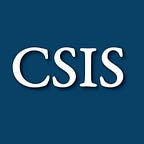The Week at CSIS: The Speeches, Discussions, and Events from May 7th to May 11th
CSIS hosts over 2,000 events a year, from major public speeches to small briefings. Join us here for an inside look at the events of the week.
5.07: Spring Summitry on the Korean Peninsula: Peace Breaking Out or Last Gasp Diplomacy?
CSIS’s Korea Chair hosted a series of distinguished experts and special guests for a conversation on the results of the April 27, 2018 inter-Korean summit and its implications for the U.S.-North Korea summit in May.
5.07: The Impact of De-risking on Nonprofit Organizations and Their Beneficiaries in Conflict Areas
Global financial institutions are increasingly terminating or restricting relationships with U.S. nonprofit organizations (NPOs), financial intermediaries, and local organizations in various regions of the world, a trend called “de-risking.” This practice, combined with a complex terror environment, poses enormous challenges to organizations working to deliver aid in areas that need it most, as well as to government policies centered around financial institutions. During this event, expert panelists discussed the findings of the country case studies, with a focus on Syria, Yemen, Somalia, and Palestine.
5.07: Four Years of Sanctions: Assessing the Impact on the Russian Economy and Foreign Policy
As Russia continues its military interventions in Eastern Ukraine and Syria, its malign influence operations across Europe and in the United States, and recently deployed a chemical weapon on NATO territory, it appears that four years of Western sanctions has not altered Russian behavior in its neighborhood and beyond. If anything, Russia has used Western sanctions as a domestic policy tool to nationalize industries while retaining access to the Western financial system. CSIS hosted a discussion exploring the impact of sanctions on the Russian economy and its foreign policy, with keynote remarks by Senator Ben Cardin (D-MD).
5.07: The Odyssey of Echo Company: Looking back on Vietnam and the Tet Offensive
Fifty years ago, the North Vietnamese Tet Offensive struck targets across South Vietnam in the hopes of toppling the government in Saigon and driving its American allies from the country. CSIS hosted Doug Stanton, New York Times bestselling author to discuss his latest book, leadership and sacrifice in wartime, and the importance of Vietnam and the Tet Offensive a half century later.
5.08: The Arctic of the Future: Strategic Pursuit or Great Power Miscalculation?
CSIS hosted a rich half-day discussion on the geostrategic and geo-economic future of the Arctic. In a moderated “exit interview,” the Commandant of the U.S. Coast Guard, Admiral Paul F. Zukunft, discussed his active public advocacy for and interagency pursuit of securing greater U.S. capabilities and readiness for a rapidly changing Arctic, as well as offer some thoughts on the overall trajectory of the Coast Guard’s future mission in the polar regions. Subsequent panels closely examined Russia’s future economic and security ambitions in the Arctic as well as address the key drivers of future economic growth and the forces that are shaping these new economic dynamics.
5.08: Financial Inclusion in the Digital Age
The Global Findex database is the world’s most comprehensive set of data on how people make payments, save money, borrow and manage risk. Launched in 2011 by the World Bank, it includes more than 100 financial inclusion indicators in a format allowing users to compare access to financial services among adults worldwide — including by gender, age and household income. CSIS hosted an event to present the findings of the most recent Global Findex data, using that as an opportunity to discuss the challenges and opportunities in financial inclusion more broadly.
5.08: Beyond Silicon Valley: How One Online Course Helped Support Global Entrepreneurs
Case Western Reserve University introduced a massive open online course, “Beyond Silicon Valley,” that fostered 135,000 registered students from 190 countries. Beyond Silicon Valley: How One Online Course Helped Support Global Entrepreneurs profiles 20 people who have supported entrepreneurship in communities around the world that face unique challenges unheard of in Silicon Valley — challenges like economic hardship, political strife, corruption or a cultural aversion to risk-taking. CSIS hosted a discussion of the book with author Michael Goldberg, Assistant Professor of Design and Innovation at the Weatherhead School of Management at Case Western Reserve University.
5.09: Centennial of the First Georgian Republic
CSIS hosted a discussion on Georgia’s evolution from 1991–2018, internal and external dynamics economic security of Georgia from a domestic, regional, and global perspective, and western strategies towards Georgia from 1991–2018.
5.09: Exit Interview with Agnes Dasewicz
CSIS hosted an exit interview with, Agnes Dasewicz, who has over 20 years of experience in private equity and impact investment in emerging markets and most recently, she served as the Director of the Office of Private Capital and Microenterprise at the U.S. Agency of International Development where she led the Agency to design and implement several key initiatives at the nexus of commercial investment and development finance.
5.11: Forty Years of U.S.-China Relations
The United States and China are approaching the 40th anniversary of the establishment of formal diplomatic relations. To commemorate this historic milestone, CSIS hosted a half-day event to discuss the twists and turns in the relationship over the last four decades and the challenges that lay ahead. The conference featured key policy figures and experts from both the United States and China.
